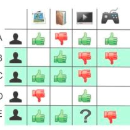Traditional recommender systems have predominantly relied on identity representations (IDs) to characterize users and items. In contrast, the emergence of pre-trained language model (PLM) en-coders has significantly enriched the modeling of contextual item descriptions. While PLMs excel in addressing few-shot, zero-shot, and unified modeling scenarios, they often overlook the critical collaborative filtering signal. This omission gives rise to two pivotal challenges: (1) Collaborative Contextualization, aiming for the seamless integration of collaborative signals with contextual representations. (2) The necessity to bridge the representation gap between ID-based and contextual representations while preserving their contextual semantics. In this paper, we introduce CollabContext, a novel model that skillfully merges collaborative filtering signals with contextual representations, aligning these representations within the contextual space while retaining essential contextual semantics. Experimental results across three real-world datasets showcase substantial improvements. Through its capability in collaborative contextualization, CollabContext demonstrates remarkable enhancements in recommendation performance, particularly in cold-start scenarios. The code is available after the conference accepts the paper.
翻译:暂无翻译




